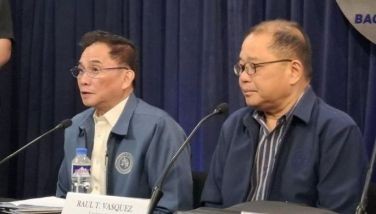US government report: RP among countries with most right abuses
March 30, 2005 | 12:00am
WASHINGTON — The Philippines is one of 98 countries in the world with the most human rights abuses, the US State Department said.
In a report on Monday entitled "Supporting Human Rights and Democracy: The US Record 2004-2005," the State Department accused Filipino security forces of extrajudicial killings and arbitrary arrest, detention and torture of suspects.
The Philippines is a vibrant democracy and its government generally respects the human rights of its citizens, but there are serious problems in some areas, the report said.
"Some elements of the security forces were responsible for arbitrary, unlawful, and, in some cases, extrajudicial killings; disappearances; torture; and arbitrary arrest and detention," the annual report said.
Unlike last year’s report which covered 196 countries, this year’s report highlights US efforts to promote human rights and democracy in only 98 countries – "those with the most human rights abuses," the State Department said.
Another difference is this year’s report on the Philippines makes no mention of human rights abuses by anti-government forces.
Last year the State Department came out with a mixed report on human rights violations in the Philippines, blaming both law enforcement agencies and communist rebels for summary executions, disappearances, torture, as well as arbitrary arrest and detention of victims.
Other countries in addition to the Philippines listed in the East Asia and Pacific group with the most human rights abuses include Cambodia, China, Indonesia, Malaysia, Myanmar, Thailand and Vietnam.
Secretary of State Condoleezza Rice, presenting Monday’s US Record, said: "Freedom, democracy and human rights are not American principles or western values. These ideals are shared by all peoples. They are the non-negotiable demands of human dignity."
In its chapter on the Philippines, the report spelled out steps the US embassy in Manila is taking to encourage respect for human rights among members of the Philippine National Police (PNP) and other law enforcement agencies.
These include training local officials in leadership and tactics and investigation and law enforcement at home and in various parts of the United States, including the FBI’s National Academy in Virginia.
The State Department also issues annual country reports on human rights practices and an international religious freedom report to highlight abuses.
The difference with this year’s US report is that this publicizes actions and programs Washington is taking to help end those abuses.
The PNP – seen as among the most corrupt government agencies – and the military both have a poor public image because of alleged human rights violations by their personnel.
Poor sense of democracy, lack of respect for human rights and a weak judiciary are among the common factors that contribute to abuses.
Human rights violations were most widespread during the brutal Marcos dictatorship. Torture was commonly used to stifle dissent.
Despite the fall of strongman Ferdinand Marcos in 1986, allegations of human rights abuses continued to hound the police and the military.
In a report on Monday entitled "Supporting Human Rights and Democracy: The US Record 2004-2005," the State Department accused Filipino security forces of extrajudicial killings and arbitrary arrest, detention and torture of suspects.
The Philippines is a vibrant democracy and its government generally respects the human rights of its citizens, but there are serious problems in some areas, the report said.
"Some elements of the security forces were responsible for arbitrary, unlawful, and, in some cases, extrajudicial killings; disappearances; torture; and arbitrary arrest and detention," the annual report said.
Unlike last year’s report which covered 196 countries, this year’s report highlights US efforts to promote human rights and democracy in only 98 countries – "those with the most human rights abuses," the State Department said.
Another difference is this year’s report on the Philippines makes no mention of human rights abuses by anti-government forces.
Last year the State Department came out with a mixed report on human rights violations in the Philippines, blaming both law enforcement agencies and communist rebels for summary executions, disappearances, torture, as well as arbitrary arrest and detention of victims.
Other countries in addition to the Philippines listed in the East Asia and Pacific group with the most human rights abuses include Cambodia, China, Indonesia, Malaysia, Myanmar, Thailand and Vietnam.
Secretary of State Condoleezza Rice, presenting Monday’s US Record, said: "Freedom, democracy and human rights are not American principles or western values. These ideals are shared by all peoples. They are the non-negotiable demands of human dignity."
In its chapter on the Philippines, the report spelled out steps the US embassy in Manila is taking to encourage respect for human rights among members of the Philippine National Police (PNP) and other law enforcement agencies.
These include training local officials in leadership and tactics and investigation and law enforcement at home and in various parts of the United States, including the FBI’s National Academy in Virginia.
The State Department also issues annual country reports on human rights practices and an international religious freedom report to highlight abuses.
The difference with this year’s US report is that this publicizes actions and programs Washington is taking to help end those abuses.
The PNP – seen as among the most corrupt government agencies – and the military both have a poor public image because of alleged human rights violations by their personnel.
Poor sense of democracy, lack of respect for human rights and a weak judiciary are among the common factors that contribute to abuses.
Human rights violations were most widespread during the brutal Marcos dictatorship. Torture was commonly used to stifle dissent.
Despite the fall of strongman Ferdinand Marcos in 1986, allegations of human rights abuses continued to hound the police and the military.
BrandSpace Articles
<
>
- Latest
- Trending
Trending
Latest
Trending
Latest
Recommended































